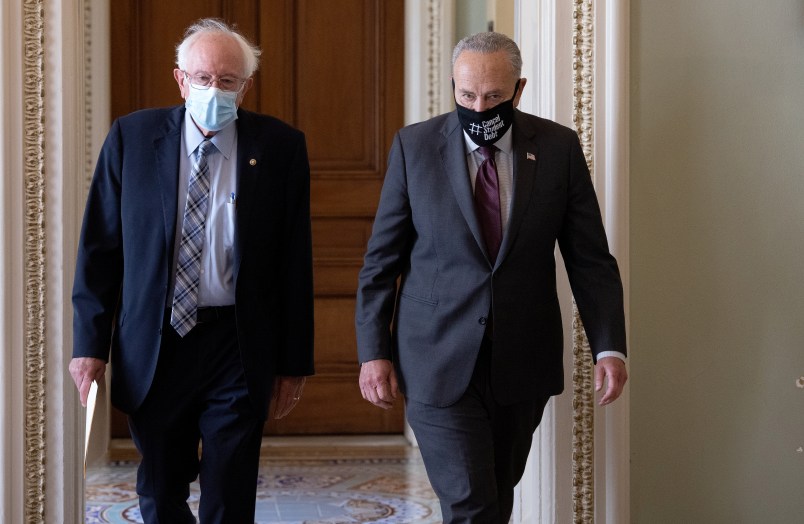At TPM, we’ve been harping on the fact that the whole bipartisan back-and-forth that unfolded over the last two months — and that might conclude early tomorrow morning — doesn’t really matter that much. It’s the reconciliation package that matters. If it passes in a form similar to what Senate Majority Leader Chuck Schumer outlined this morning, it would be the most significant progressive legislation in at least a decade.
It might also be the last significant progressive legislation for at least a decade.
As my colleagues Kate Riga and Josh Kovensky have written, there’s a recognition among activist groups that this package is the last train out of town for a long while. Next year, we’ll be in a midterm election cycle. Then, Republicans could retake a chamber of Congress. Redistricting continues to make it harder and harder for Democrats to win, and a new cycle is kicking off following last year’s census. More than half of the Republicans in the House voted to overturn the last presidential election. Our democracy isn’t in great health.
It’s not clear when Democrats will have this level of power — the White House, the House, and functional control of the Senate — again. If they’re going to get things done, there’s a pretty strong argument that those things have to get done in the next few months.
The urgency is especially acute among climate activists, a policy area injected with a fresh wave of urgency by this morning’s IPCC report. The reconciliation package, Schumer’s office said this morning, will contain a provision that functions like a national clean energy standard (the Clean Electricity Payment Program), and a suite of clean energy tax credits. Longtime climate journalist David Roberts has the best explainer on these provisions — and their urgency — that I’ve seen. He writes:
Climate folk are prone to endless policy arguments; everyone has their favorites. But most of those arguments are immaterial right now. Democrats have lined up behind a menu of clean energy policies in line with Biden’s climate plan. What’s on that menu is what might get in the bill. Might.
If it’s not on that menu, it’s not going to get in. There’s no carbon tax. There’s no cap-and-dividend. There’s no prohibition on new fossil fuel infrastructure. You may support any and all of those policies, but they are not live options in the reconciliation bill.
Right now, political pressure is best aligned behind options that actually are on the menu. Two in particular are immensely important — together, they would be transformative.
[…]
Tax credits will provide the supply push; the CEPP will provide the demand pull. The result will be an enormous surge of clean energy projects and jobs.
This is the core of good climate policy: pushing fossil fuels off the grid over the next decade and replacing them with zero-carbon energy.
Significant climate legislation has been rare. Congress has done little to act on the issue since climate change first emerged as a recognizable phenomenon, decades ago. Large developing nations, citing U.S. inaction, balked for years at doing much about their own climate change-causing emissions. And here we are.
This year, the Senate might do something. But if it doesn’t, it’s not clear when the next opportunity will come.
The Best Of TPM Today
- A Lead IPCC Author Explains The Profound Changes Underway In Earth’s Oceans And Ice
- Senate Dems Release Historic, All-Encompassing Budget Resolution
- Senate Big Lie Investigators To Interview Georgia U.S. Attorney Who Abruptly Quit
Yesterday’s Most-Read Story
- Biden Is Having His Cake and Eating It Too — Josh Marshall
What We Are Reading
- Inside One Company’s Struggle to Get All Its Employees Vaccinated — Nicole Hong, New York Times
- What Redistricting Looks Like In Every State — FiveThirtyEight
- Trump Sails Away as Rudy Giuliani Drowns in Legal Bills — Asawin Suebsaeng and Adam Rawnsley, Daily Beast






